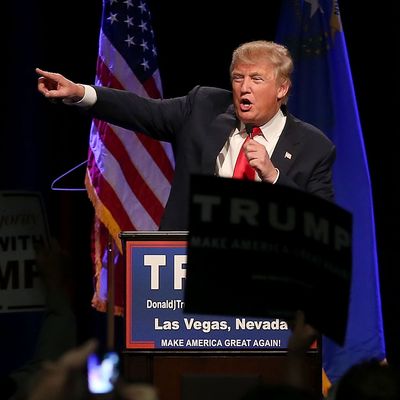
On Monday night, protesters interrupted a Donald Trump rally, shouting about gun control and proclaiming that black lives matter. The large crowd of Trump supporters shouted back at them. MSNBC News reporter Benjy Sarlin described how, “as one man was dragged away, people in the crowd variously yelled, ‘Shoot him!’ ‘Kick his ass’ … ‘Light the motherfucker on fire!’” One man yelled, “Sieg Heil!”
It has been a violent, sad year marked by mass shootings and police violence and acts of terror and a seemingly endless supply of vitriol and anxiety. But while that series of events may have felt like a random, scary blur as we lived through it, it’s coming into stark and horrifying relief at year’s end thanks to the blaring optics of our presidential-election cycle.
Our first black president sits in the White House, entering his eighth and final year; in his party, a woman who would become the first female commander-in-chief is building a substantial lead in national polls. Meanwhile, the dominant front-runner of the opposing party plays untroubled host to white-power revivalist meetings, suggests that “deportation forces” should “round up” undocumented immigrants, and proposes identification badges for Muslims. Donald Trump’s competitors for the Republican nomination — who agree with him that abortion should be illegal, and many of whom even believe that women who have been raped or suffered incest should be forced to carry resulting pregnancies to term — somehow look rational and moderate by comparison. But Ted Cruz is no moderate: He touts his endorsement by Operation Rescue president Troy Newman, who has advocated for the execution of “convicted abortionists” and defended activists who have in fact killed abortion doctors. “We need leaders like Troy Newman in this country,” Ted Cruz, who might be the Republican nominee for president in 2016, has said.
Increasingly, the press is bold and unapologetic in its comparisons of this moment to earlier, presumably nastier points in history. Trump’s rowdy, racist gatherings recall “the ugliness of a George Wallace rally from 1968,” and the candidate himself has been compared to late-19th-century South Carolina governor Benjamin Tillman, who “touted violent terrorism as a tactic for maintaining white supremacy.” This week’s news of a Tennessee woman who was charged with attempted murder after attempting to self-abort a 24-week pregnancy with a coat hanger provoked recollections of a pre-Roe United States, in which underground abortions caused the death of an estimated 5,000 women a year, the majority of whom were likely women of color. Naturally, Monday’s Nazi rallying cry made awkward comparisons between Trump and der Führer a hell of a lot easier to make, and the calls to set black activists on fire returned us to the Jim Crow South, in which, Isabel Wilkerson has written, “someone was hanged or burned alive … every four days.”
But comparisons to earlier eras obscure the grim reality that what we are living through is not the echo of past risks, but rather our own present danger.
This moment, this election, these years represent the death throes of exclusive white male power in the United States. That the snarling fury and violence are contemporary does not make them less real than the terrors of previous periods; it makes them more real, at least to those of us living through them. And the presidential-primary contest, while absurdist and theatrical, is reflecting very real fury and violence in the non-electoral world: the burning of crosses and black churches, the execution of black men by police, the resistance of male soldiers to women in elite combat positions, a white man with a history of violence against women himself a “warrior for the babies” after killing people at a Planned Parenthood clinic, and a younger white man killing nine black churchgoers with the explanation “You rape our women, and you’re taking over our country.”
The political contest just projects these panicked resentments on a bigger, more official screen. The public spectacle of this presidential election, and the two that have preceded it, are inextricably linked to the racialized and gendered anger and violence we see around us. Recall that Trump’s rise in politics began with his attacks on Barack Obama as foreign, as Muslim, as other. And that the tea party whence Ted Cruz springs has concerned itself mostly — official protestations about economic priorities to the contrary — with shutting down reproductive-health options for women. That is, when they are not trying to shut down the political ambitions of Hillary Clinton at any cost (see Trey Gowdy’s wild-eyed, profligate, and fruitless Benghazi investigation).
Whatever their flaws, their political shortcomings, their progressive dings and dents, Barack Obama and Hillary Clinton mean a lot. They represent an altered power structure and changed calculations about who in this country may lead. It is not coincidence that after seven years of a black president people are calling for lynchings at Republican rallies. It’s not some random quirk that eight years after a woman almost became the Democratic nominee, Republican candidates are crowing about their commitment to making pregnancy compulsory and accepting the endorsements of those who support violence against abortion providers.
This is our country in an excruciating period of change. This is the story of the slow expansion of possibility for figures who have long existed on the margins, and it is also the story of the dangerous rage those figures provoke. Listen closely, and you’ll hear the acknowledgment coming directly from the Republican candidates. Here was Marco Rubio in Tuesday’s debate: “What’s at stake in this election is not simply what party’s going to be in charge but our very identity as a people and as a nation.” This is not a dog whistle. This is a statement of fact.
There are those on the right and the left who love to downplay identity politics as a distraction: Do we even believe in race or gender as anything but social constructs? How do identity politics apply to Carly Fiorina or Ben Carson — or to Marco Rubio or Ted Cruz, for that matter? Isn’t worrying about gender and race with regard to presidential politics just narcissism anyway?
But it’s not narcissism. This election is a referendum on the existence and civic participation of Americans who are not white men — as voters, as citizens, as workers, as members of the military, as presidents.
And while the resistance may be symptomatic of death throes, a rage at the dying of the white male light, it nonetheless presents a very real threat — there is the possibility that the old and angry may triumph over the new and different. Those who are furious are not without power to effect change that lasts generations: Imagine Ted Cruz or Donald Trump or Marco Rubio in office with a Republican Congress and Supreme Court seats to fill. Voting: restricted. Immigration: halted. Abortion: banned. Equal pay: unprotected. Same-sex marriage: overturned.
Imagine, on the other hand, a Clinton presidency — or even a Sanders one, though even a white male Jewish socialist may invite less ire than a woman. Clinton, like Obama before her, isn’t carrying just her own baggage, but will stand in as the symbolic target for those whose fury at increased female autonomy has been building. In a nation where women who were not permitted to cast votes still live and breathe, her campaign, as Ms. Clinton has herself declared in other contexts, is living history. If she wins, she — and we — will be forced to do battle with this rising, chilling, ever more open threat from those who feel enraged that their country is no longer their own. I fear that there’s a lot more terror ahead of us.
*This article has been updated since its original publication. A version of it appears in the December 28, 2015 issue of New York Magazine.





